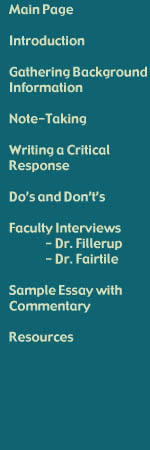

Gathering Background Information
Content by Lauren Oddo
Adapted for Web by Kelsey Shields
(printable version here)
Do your homework before a performance!
During the performance, it is important to strategically record key aspects of the show, in order to produce an accurate and informative reaction. To do this, you must arrive to a show with expectations and general background knowledge about the performer (s), as well as a basic understanding about the showís repertoire.
Gathering background information about performer (s):
Familiarize yourself with the performer (s) you are going to see. This is important because our expectations about a performance will change depending on the type of ensemble or performer we see. A string quartet performance, for instance, will follow a dissimilar dynamic than an improvisational jazz concert. So, do a little research; go to the performer (s) website (s), explore concert reviews from past performances by the same artist (s), and talk to a friend, family, or professor who may provide some helpful insight. You have many of these resources right at your fingertips!
Generating an understanding of the concert repertoire:
Typically, musicians will publish a list of the pieces they plan to perform in concert. These lists may be found either on the musiciansí websites, or on a webpage from the hosting venue; regardless, the program, or a list of a few works included in the program, will almost always be accessible online. The University of Richmondís Modlin Center, for instance, features upcoming performance on their website, and also provides specific information regarding each artist or performance. On webpages such as the Modlin Centerís, we may gather information about the cost of the performance, repertoire, and artist information (including links to the artistís personal websites).
Understanding the composer:
Once you find the concertís repertoire, itís time to do some research into composers. A simple Google search will provide useful background information about composersí eras (Baroque, Classical, Romantic, etc.) which will in turn inform you about a pieceís composition style.
Back to Music Main Page
Other Disciplines | Writer's Web | Writing
Center | Make
an Appointment | Library
Copyright Info